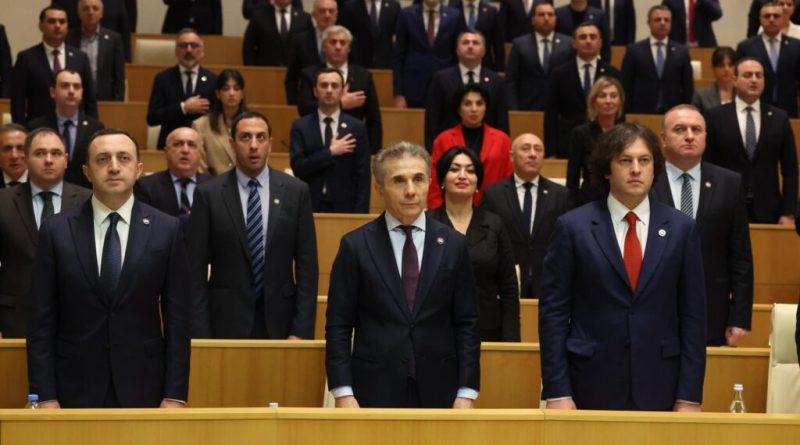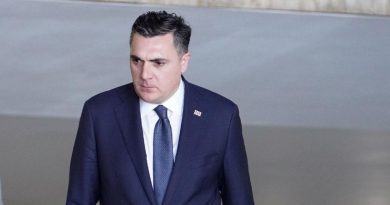Treason of Homeland: Necessary Criminal Code Article or Georgian Dream Manipulation

Georgian Dream has decided to track down the “enemies of the people.” The ruling party announced the return of an article regarding treason of homeland, among other items, following plans to conduct a “Nuremberg Trial” of the United National Movement. Experts consider this a populist initiative and warn it’s another signal that the authorities are strengthening their repressive power.
Translated by Adrian Bader
The first to announce the possible return of Criminal Code Article 307 (on treason) was Executive Secretary Mamuka Mdinaradze after a meeting by Georgian Dream political councils. Critics are calling him a spokesperson for oligarch Bidzina Ivanishvili as Mdinaradze holds the head speaking role for the party.
“Based on our decision, an article–removed at one time by National Movement–regarding high treason will be added, or rather, reinstated in the Georgian Criminal Code.”
According to Mdinaradze, the new edition will be the same as the prior except for the name: instead of High Treason, the article will now be called Treason of Homeland.
In 2007, the Mikheil Saakashvili administration removed it from the Criminal Code due to its lack of legal burden; the article on treason didn’t provide a separate punishment, and in fact, the person was tried under other parts of the Criminal Code.
Georgian Dream repeatedly specified that the reform was implemented a year before the August War. Therefore, the decision to return the article to the criminal code seems quite logical in the background of parliament forming a temporary commission to investigate former powers’ activity. Deputies have promised to provide a “legal assessment” of the National Movement’s politics, which, in their opinion, led to the war with Russia.
The controversial deputy, Irakli Zarkua, believes that the article was removed almost two decades ago by “Saakashvili and his gang” so that they didn’t fall under it in the future. “They absolutely knew that what they were doing wasn’t in the interest of the state,” Zarkua said, adding that everyone “who is hostile towards their country, church, and especially the interests of Georgia will be harshly punished.”
Political scientist Gia Khukhashvili, in turn, noted that authorities supporting geopolitical processes capable of returning the country to Russia’s empire is treason.
“The article Georgian Dream announced regarding homeland treason confirms their suicidal tendencies.”
Similar statements were made by the opposition. “In the past, Zviad Gamsakhurdia [the first president] was going to be tried under the article on treason, and this was a political element. Looking from a legal point of view, the illegitimate Georgian Dream should present this accusation themselves,” said Giorgi Kapanadze, a member of the United National Movement.
In the past, the Ivanishvili party also proposed restoring Article 307. In 2020, Mdinaradze explained the necessity of it by investigating the so-called Cartographers’ Case. The opposition and human rights activists at that time spoke about the authorities’ political motivation and their manipulation of public opinion on the eve of parliamentary elections.
The criminal case was opened against a former head and an employee on the commission demarcating the border with Azerbaijan. They were accused of approving a site located in the David Garedji monastery complex on Georgian territory. The investigation covered the commission’s activity from 2006 to 2009.
“After another agreement, over 300 hectares of land were determined not on Georgian land; about a month after (we’ll call it a coincidence if anyone believes that) in April or March of 2007, parliament removed the clause on treason,” Mdinaradze then said.
The Reasoning Behind Returning the Article
As experts indicated, the article on treason appears as a declarative norm. Everything it includes is covered by different points of the Criminal Code: Espionage (Article 314), Disclosure of State Secrets (313), Assisting Foreign State or Organizing Hostile Activities (319), Conspiracy to Forcibly Change Georgian Constitution (315).
Lawyer Irakli Chomakhashvili emphasizes that despite the absence of Article 307, government treason is still punishable.
“Nobody abolished anything, there was no decriminalization or legalization of anything.”
Moreover, in some situations, the penalties for actions damaging the interest of the state were even harsher, according to him.
Article 307 itself had no structure and didn’t provide for sanctions. It contained a list of what could fall under treason: espionage, overthrowing the government, and revealing classified information.
Chomakhashvili explained that such crimes of treason remained in the Criminal Code, and the removal of the article was only a correction of a legislative error.
Speaker of Parliament Shalva Papuashvili, however, insists on the need to have a name for those who violate the listed articles in order to illustrate the severity of the crime.
“Treason of the homeland is a severe crime which must be called by name, not technical terms.”
But if Georgian Dream returns the article to the Criminal Code without a change, it will serve as a symbol. It can be used for deceptive purposes. For many, such wording reminds of Soviet times, when the term ‘enemy of the people’ was used for people disobeying power. It was especially used during the Stalinist repressions. Today, the term foreign agent is used for a similar purpose.
On Georgian social media, people are reminded of how the USSR labeled traitors. Many prominent writers, poets, scientists, and public figures were tried as such, for example, Paulo Iashvili, Titsian Tabidze, and Mikhail Javakhishvili.
In leading countries, there are no laws on treason, or if there are, they’re only used in exceptional cases. For instance, in 2006, in the United States, action was taken for the first time in 60 years when an American figure skater joined Al-Qaeda and promised to “flood the streets of the country in blood.” In the US, the law has only been used once since World War II, in Russia, in just the first half of 2024, they charged 52 people.
Who Can Be Considered a Homeland Traitor
Upon the fifth President of Georgia, Salome Zurabishvili, and earlier opposition leader of For Georgia, Giorgi Gakharia’s return from a Munich conference on safety, they were attacked directly in the Tbilisi Airport. So-called titushki, assumed to be linked to the authorities, threw eggs at them.
Secretary General of Georgian Dream and Tbilisi Mayor Kakha Kaladze commented on the clips. Although he condemned them, he also made it clear that political leaders who criticize the authorities on international platforms might themselves end up being tried:
“Throwing eggs or any insult to me, unlike them [the opposition], is unacceptable. But the law will be toughened, and everyone responsible for the betrayal will need to be punished.”
According to Kaladze, recently, society has watched “certain groups and individuals performing tasks received from the outside and in the interests of a foreign state.” He’s convinced that these people took steps rooted in hatred and evil and attempted to divide society.
Kaladze also identified specific facts of financing extremist organizations and radicalists in Georgia as well as several attempts to overthrow the government. He added, “All questions need to be answered appropriately.”
Deputy Dito Samkharadze assaulted oppositionist Giorgi Gakharia and again threatened political opponents, this time in the context of restoring the article on treason. After posting footage of money allegedly being handed out to anti-government protesters, he promised soon, “USAID and NED atrocities will be exposed, and a list of bribed, supposedly patriotic Georgians will be published.”
“Everyone will see the price of being rootless and how expensive betraying Georgia is! Political prostitutes, beware.»
According to lawyer Irakli Chomakhashvili, today, Georgian Dream is attempting to return the article on treason to the Criminal Code with the goal of propaganda and manipulation. He recalled that recently, the State Service has started to investigate coup attempts, adding:
“After these amendments, the government will say an investigation of treason has begun. This serves as propaganda to promote wrong feelings towards the opposition and peaceful citizens.”
Constitutionalist Vakhushti Menabde also believes that the main target of these amendments to the Criminal Code is anti-government protesters.
Georgian Dream needed to establish penalties for high treason solely to further spread their propaganda. This is an attempt to stigmatize and diminish people using a specific label. Today, we, the members of the resistance movement, pose a large threat to the ruling party, larger than those political opponents who we call the opposition.




